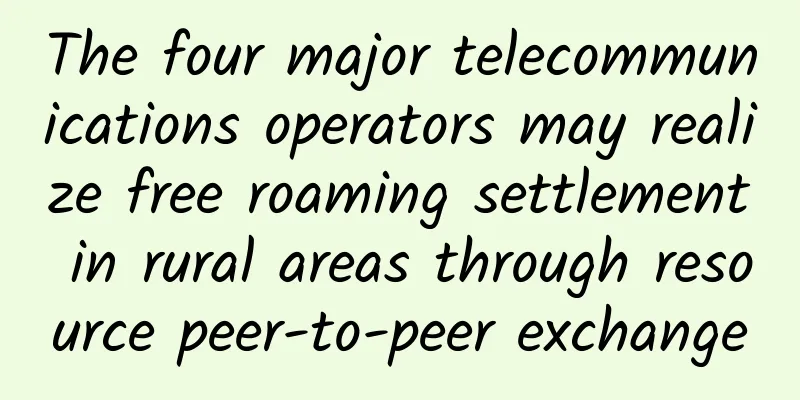The four major telecommunications operators may realize free roaming settlement in rural areas through resource peer-to-peer exchange

|
In response to the question of how the four major telecom operators will settle roaming charges in the future, I can firmly and responsibly tell you that the four operators' mutual opening and sharing of roaming services is a practical action to thoroughly implement the people-centered service concept, do practical things for the people, and serve the people.
Under the guidance of the five development concepts of openness and sharing, and driven by major technological revolutions such as cloud-network integration and cloud computing, blockchain and network slicing, the time is ripe for the four operators to open up, share and interconnect with each other, and implement peer-to-peer exchange of network resources. This is also an inevitable trend of cloud-network integration. The mutual peer-to-peer exchange of the four major operators' Internet settlements can basically realize free roaming among the four operators. For example, in the past few years, China Telecom in the south and China Unicom in the north have already provided China Mobile with free wired broadband network settlement fees, which has caused China Telecom and China Unicom to lose tens of billions of yuan in wired broadband network settlement fees every year. Now it is China Mobile's turn to open up mobile Internet roaming fees to China Telecom and China Unicom for free. This is the inevitable result of the equal exchange of network resources among the four companies and free roaming fees for each other under the background of cloud network integration and three-network integration. The four parties exchange resources on a reciprocal basis, interconnect with each other and cooperate for mutual benefit. There is no question of who gets something for free. Instead, through market-oriented mechanisms, they flexibly use the reciprocal exchange of network resources, and ultimately achieve a new pattern of innovative development of intensive public infrastructure with complementary advantages, synergy, mutual benefit, shared competition and cooperation. In addition, will the implementation of roaming among the four major telecom operators in county-level and lower administrative areas lead to a lack of enthusiasm and motivation for some operators to build networks? If the four carriers' roaming on different networks happened in a capitalist market economy country, it might lead to insufficient motivation for operators to build networks. However, China is a socialist market economy, and the telecommunications central enterprises in the socialist market economy are very different from the capitalist privatized market economy of the United States. In the future, the construction of 5G networks will be planned and directed by the state. For example, the state can plan and direct China Mobile to build 700M low-frequency 5G base stations in rural areas. Whether you like it or not, this is what the socialist market economy must do. China's socialist market economy is very different from the American capitalist market economy, understand?! |
<<: WiFi 7 will have these improvements with a speed 2.4 times faster than WiFi 6
>>: API Gateway Selection: I use OpenResty!
Recommend
In the era of cloud computing, what issues should data center operation and maintenance pay attention to?
In the era of cloud computing, IT system construc...
The 5G standard is here, when will the licenses and mobile phones arrive?
Just a few days ago, the plenary session of the i...
If you want AI, come to Chongqing Smart Expo! Huawei brings two "magic weapons" to in-depth exchanges on the intelligent industry
[51CTO.com original article] On August 23, the th...
Proactive monitoring without embedding: a best practice for proactively perceiving user experience
The business world is like a battlefield. Whoever...
LRU implementation with expiration time
[[382833]] I saw this algorithm a long time ago w...
When WiFi Master Key quietly takes away your password, do you really not mind?
Many Internet companies or products , in the name...
What is 5G IoT and how will it change connectivity?
[[349454]] 5G will fundamentally change the way o...
TCP network stuff! Three-way handshake, four-way handshake, TIME-WAIT, HTTP 2.0 ....
[[419435]] Hello everyone, I am Tom~ Today I will...
How to find the IP address of the router to improve work efficiency
How to find the IP address of a router is an esse...
China Mobile builds the world's largest 5G network
One year after 5G was officially put into commerc...
The "5G messages" of the three major operators are about to be commercialized. What impact will it have on SMS and WeChat?
At the 5G Message High-level Forum of the China I...
The 5G Spring Festival Gala is coming, but who will ensure its security?
The Chinese New Year is getting closer and closer...
Let’s talk about the privacy and security of 5G technology
On March 17, 2022, the European Parliament's ...
Sangfor Launches SIP Falcon Edition: A Lightweight and Cost-Effective Full-Flow Threat Analysis System
In recent years, with the deepening of informatiz...









